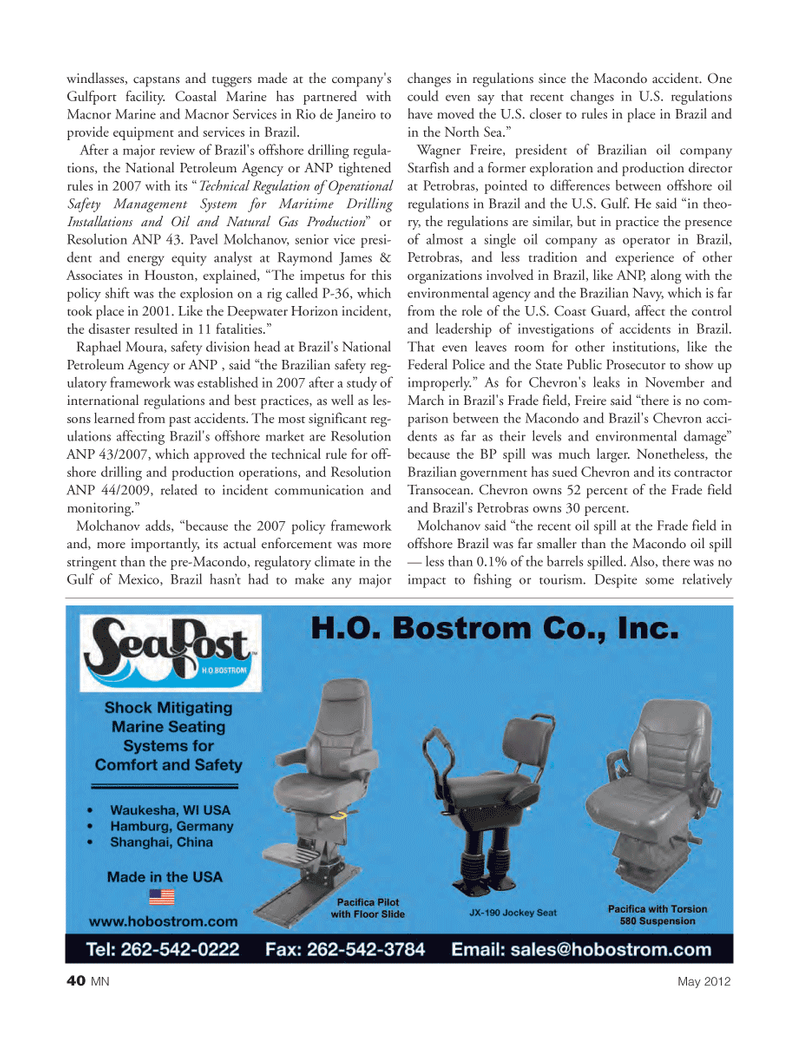
Page 40: of Marine News Magazine (May 2012)
Combat Craft Annual
Read this page in Pdf, Flash or Html5 edition of May 2012 Marine News Magazine
windlasses, capstans and tuggers made at the company'sGulfport facility. Coastal Marine has partnered with Macnor Marine and Macnor Services in Rio de Janeiro to provide equipment and services in Brazil. After a major review of Brazil's offshore drilling regula- tions, the National Petroleum Agency or ANP tightened rules in 2007 with its ? Technical Regulation of Operational Safety Management System for Maritime Drilling Installations and Oil and Natural Gas Production ? orResolution ANP 43. Pavel Molchanov, senior vice presi- dent and energy equity analyst at Raymond James & Associates in Houston, explained, ?The impetus for this policy shift was the explosion on a rig called P-36, whichtook place in 2001. Like the Deepwater Horizon incident, the disaster resulted in 11 fatalities.? Raphael Moura, safety division head at Brazil's National Petroleum Agency or ANP , said ?the Brazilian safety reg- ulatory framework was established in 2007 after a study of international regulations and best practices, as well as les- sons learned from past accidents. The most significant reg- ulations affecting Brazil's offshore market are Resolution ANP 43/2007, which approved the technical rule for off- shore drilling and production operations, and Resolution ANP 44/2009, related to incident communication and monitoring.?Molchanov adds, ?because the 2007 policy framework and, more importantly, its actual enforcement was more stringent than the pre-Macondo, regulatory climate in the Gulf of Mexico, Brazil hasn?t had to make any major changes in regulations since the Macondo accident. One could even say that recent changes in U.S. regulations have moved the U.S. closer to rules in place in Brazil and in the North Sea.? Wagner Freire, president of Brazilian oil company Starfish and a former exploration and production director at Petrobras, pointed to differences between offshore oil regulations in Brazil and the U.S. Gulf. He said ?in theo- ry, the regulations are similar, but in practice the presence of almost a single oil company as operator in Brazil, Petrobras, and less tradition and experience of other organizations involved in Brazil, like ANP, along with the environmental agency and the Brazilian Navy, which is far from the role of the U.S. Coast Guard, affect the control and leadership of investigations of accidents in Brazil. That even leaves room for other institutions, like the Federal Police and the State Public Prosecutor to show up improperly.? As for Chevron's leaks in November and March in Brazil's Frade field, Freire said ?there is no com- parison between the Macondo and Brazil's Chevron acci- dents as far as their levels and environmental damage? because the BP spill was much larger. Nonetheless, the Brazilian government has sued Chevron and its contractor Transocean. Chevron owns 52 percent of the Frade field and Brazil's Petrobras owns 30 percent. Molchanov said ?the recent oil spill at the Frade field in offshore Brazil was far smaller than the Macondo oil spill ? less than 0.1% of the barrels spilled. Also, there was no impact to fishing or tourism. Despite some relatively 40MNMay 2012MN#5 (32-49):MN 2011 Layouts 5/7/2012 10:07 AM Page 40

 39
39

 41
41
